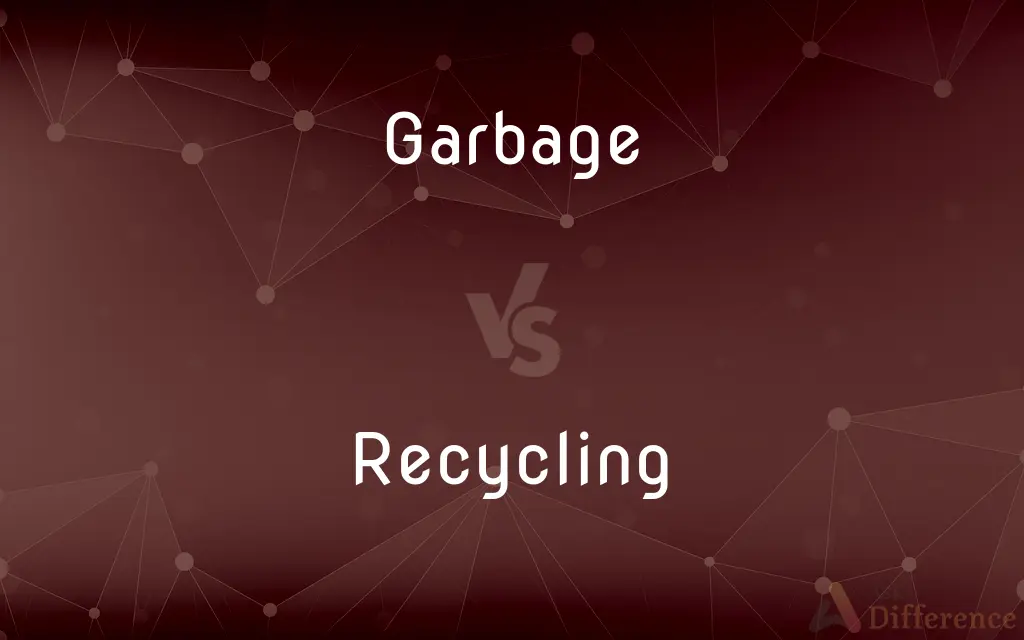Garbage vs. Recycling — What's the Difference?
By Tayyaba Rehman & Maham Liaqat — Updated on May 9, 2024
Garbage refers to waste discarded as unusable or unwanted, while recycling involves processing materials to reuse them, reducing environmental impact.

Difference Between Garbage and Recycling
Table of Contents
ADVERTISEMENT
Key Differences
Garbage consists of waste products considered unusable and are often disposed of in landfills. Recycling, in contrast, involves sorting and processing specific materials like paper, plastic, or metal to make new products, thus conserving resources.
In garbage disposal, waste is typically collected and transported to a landfill or incinerated. Recycling requires sorting waste into different categories to be cleaned, processed, and transformed into new products.
Garbage often leads to environmental issues such as soil contamination and methane emissions from landfills. Recycling helps reduce these problems by minimizing the amount of waste that ends up in landfills and conserving natural resources.
Most garbage includes non-recyclable items that either can't be processed or aren't valuable enough to recycle. Recyclable materials like aluminum, paper, and glass can be remanufactured into new products, reducing the need for raw materials.
Garbage disposal costs can accumulate due to the high cost of landfilling. In comparison, recycling can offset waste management costs by producing valuable commodities, encouraging businesses to participate in sustainable practices.
ADVERTISEMENT
Comparison Chart
Definition
Waste considered unusable or unwanted
Processing materials to reuse and repurpose
Disposal
Landfilled or incinerated
Sorted, cleaned, and transformed into new items
Environmental Impact
Contributes to pollution
Reduces waste and conserves resources
Processing
Minimal sorting or categorization
Extensive sorting, cleaning, and repurposing
Costs
High due to landfill/incineration fees
Potentially profitable with valuable materials
Compare with Definitions
Garbage
Items considered worthless or not needed.
He threw his old sneakers in the garbage because they were beyond repair.
Recycling
Repurposing materials to create new products.
The company promotes recycling by turning old tires into playground flooring.
Garbage
Unwanted or unusable material discarded as refuse.
The garbage from yesterday's party filled several bags.
Recycling
Categorizing waste into types like paper, glass, and plastic.
Recycling requires careful sorting to ensure proper processing.
Garbage
A site for burying garbage.
The city opened a new landfill to handle increasing garbage.
Recycling
Organic recycling to create nutrient-rich soil.
The kitchen scraps were put in the compost bin for recycling.
Garbage
Burning waste at high temperatures.
The plant uses incineration to reduce the volume of garbage.
Recycling
Creating new items from recycled materials.
Aluminum recycling saves energy by remanufacturing cans.
Garbage
Items that can't be processed for reuse.
Food waste is often considered garbage due to its non-recyclable nature.
Recycling
Meeting current needs without compromising the future.
Recycling is a core principle of sustainability, reducing waste and conserving resources.
Garbage
Garbage, trash, rubbish, or refuse is waste material that is discarded by humans, usually due to a perceived lack of utility. The term generally does not encompass bodily waste products, purely liquid or gaseous wastes, nor toxic waste products.
Recycling
Recycling is the process of converting waste materials into new materials and objects. The recovery of energy from waste materials is often included in this concept.
Garbage
Rubbish or waste, especially domestic refuse
A garbage dump
Garbage littered the estate
Recycling
The activity or process of extracting and reusing useful substances found in waste.
Garbage
Food wastes, as from a kitchen.
Recycling
Materials that have been set apart from refuse so that they can be recycled
She set the recycling out by the curb.
Garbage
Refuse; trash.
Recycling
The practice of sorting and collecting waste materials for new use.
Garbage
A place or receptacle where rubbish is discarded
Tossed the apple core into the garbage.
Recycling
(uncountable) Those materials culled for recycling.
He plans to haul the recycling in on Saturday.
Garbage
Worthless or nonsensical matter; rubbish
Their advice turned out to be nothing but garbage.
Recycling
Present participle of recycle
Garbage
Inferior or offensive literary or artistic material.
Recycling
The act of processing used or abandoned materials for use in creating new products
Garbage
Food waste material of any kind.
Garbage
Useless or disposable material; waste material of any kind.
The garbage truck collects all residential municipal waste.
Garbage
A place or receptacle for waste material.
He threw the newspaper into the garbage.
Garbage
Nonsense; gibberish.
This machine translation is garbage
Garbage
Something or someone worthless.
Garbage
(obsolete) The bowels of an animal; refuse parts of flesh; offal.
Garbage
An easy shot.
Garbage
To eviscerate
Garbage
(informal) bad, crap, shitty
Garbage
Offal, as the bowels of an animal or fish; refuse animal or vegetable matter from a kitchen; hence, anything worthless, disgusting, or loathsome.
Garbage
To strip of the bowels; to clean.
Garbage
Food that is discarded (as from a kitchen)
Garbage
A worthless message
Garbage
A receptacle where garbage is discarded;
She tossed the moldy bread into the garbage
Common Curiosities
Is recycling always environmentally beneficial?
Yes, though it requires energy and resources, it often reduces waste and resource extraction.
What types of garbage can be recycled?
Paper, plastics, glass, and metals are commonly recyclable.
Why is recycling important?
Recycling conserves resources, reduces landfill waste, and decreases pollution.
Can all garbage be recycled?
No, not all garbage is recyclable; some items are non-recyclable.
Can recycling be economically beneficial?
Yes, recycling can generate revenue by creating valuable commodities.
Why isn't all garbage recyclable?
Some materials are too contaminated or have no economic value for recycling.
Is burning garbage a good alternative to landfills?
Incineration reduces volume but can produce harmful emissions.
Does garbage disposal contribute to pollution?
Yes, landfills emit methane and can contaminate soil and water.
How do I know if something can be recycled?
Check local recycling guidelines or product packaging for symbols and instructions.
What happens to garbage in landfills?
It decomposes slowly, emitting gases and sometimes leaking harmful substances.
Can recycling replace garbage disposal entirely?
No, some waste still requires disposal, but recycling can significantly reduce it.
Is composting considered recycling?
Yes, composting is a form of organic recycling.
Are all plastics recyclable?
Not all plastics are recyclable due to different types and contamination.
How can I reduce my garbage output?
By recycling, composting, and choosing reusable items.
Does recycling require sorting?
Yes, sorting materials correctly is crucial for effective recycling.
Share Your Discovery

Previous Comparison
Guideline vs. Requirement
Next Comparison
Everolimus vs. RapamycinAuthor Spotlight
Written by
Tayyaba RehmanTayyaba Rehman is a distinguished writer, currently serving as a primary contributor to askdifference.com. As a researcher in semantics and etymology, Tayyaba's passion for the complexity of languages and their distinctions has found a perfect home on the platform. Tayyaba delves into the intricacies of language, distinguishing between commonly confused words and phrases, thereby providing clarity for readers worldwide.
Co-written by
Maham Liaqat















































